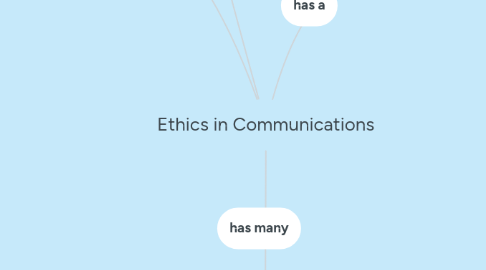
1. Ethical Challenges
1.1. Media Ethics
1.1.1. Utilitarian Approach
1.1.1.1. In all circumstances to create the most general happiness and least unhappiness. morality is determined by consequences/results of the action, rather than motivation/intent.
1.1.2. The Fairness or Justice Approach
1.1.2.1. The basic moral question in this approach is: How fair is an action? Does the action treat everyone in the same way, or does it show favoritism and discrimination?
1.1.2.1.1. Favoritism gives benefits to some people without a justifiable reason for singling them out. Discrimination imposes burdens on people who are no different from those on whom burdens are not imposed.
1.1.3. The Common-Good Approach
1.1.3.1. Are social policies, social systems, institutions, and environments on which we depend beneficial to all?
1.1.3.1.1. Examples of goods common to all include affordable health care, effective public safety, peace among nations, a just legal system, and an unpolluted environment.
1.1.4. The Virtue Approach
1.1.4.1. The virtue approach to ethics assumes that there are certain ideals toward which we should strive, which provide for the full development of our humanity. These ideals are discovered through thoughtful reflection on what kind of people we have the potential to become.
1.1.5. The Rights Approach
1.1.5.1. People have dignity based on their ability to choose freely what they will do with their lives, and they have a fundamental moral right to have these choices respected.
1.2. Journalism Ethics
1.2.1. Accuracy
1.2.1.1. When you read a story or watch a report, you as the consumer assume that it's true. Accuracy means getting all the facts right and always seeking the truth.
1.2.2. Conflict of interest
1.2.2.1. A reporter writing about a company in which they own stock, an organization to which they belong, or even the schools their children go to
1.2.3. Invasion of Privacy
1.2.3.1. An unwelcome intrusion on a person's solitude or personal affairs Examples: Private information such as your school or medical record cannot be printed in public forum like newspapers without your permission.
1.3. Public Relations Ethics
1.3.1. Copyright law
1.3.1.1. . Any written sources which are not original should be cited in following works. Internet references should also adhere to traditional copyright procedures for securing appropriate permissions.
1.3.2. Fair Comment
1.3.2.1. This privilege insulates a reporter or publication against defamation (libel or slander.) The information must be related to community interest with the subject.
1.3.2.1.1. Fair comment, which involves privacy, should not be confused with fair use, which involves copyright.
2. Ethical Thinkers
2.1. Aristotle
2.1.1. Moderation is the best course. However, moderation doesn't always offer a solution; sometimes it takes definitive action one way or the other.
2.2. Immanuel Kent
2.2.1. Emphasizes moral decision making from an intellectual, rather than an intuitive, standpoint.
2.3. Confucius
2.3.1. The worldly concern of Confucianism rests upon the belief that human beings are fundamentally good.
2.4. John Locke
2.4.1. Locke believed that everyone was of a positive nature and believed everyone was essentially fair and unselfish.
2.5. John Stuart Mills
2.5.1. Advocated strongly for the preserving of individual rights and called for limitations to the power and authority of the state over the individual.
2.6. Nietzsche
2.6.1. Nietzsche believes that all normative systems which perform something like the role we associate with "morality" share certain structural characteristics, even as the meaning and value of these normative systems vary considerably over time.
3. Respect for privacy
3.1. "Reporters will show respect for the dignity, privacy, rights and well-being of people at all times." (Society of Professional Journalists)
4. has many
5. relates to
6. began with
7. has a
8. Code of Ethics
8.1. National Press Photographers Association
8.1.1. The National Press Photographers Association is a professional society that promotes the highest standards in visual journalism and informs people about public events.
8.2. Radio-Television Digital News Association
8.2.1. "Professional electronic journalists should not: Report anything known to be false. Manipulate images or sounds in a way that is misleading. Plagiarize, Present images or sounds that are reenacted without informing the public."
8.3. Society for Professional Journalists
8.3.1. "Ethical Journalists treat sources, subjects and colleagues as humans beings deserving of respect"
8.4. Public Relations Society of America
8.4.1. "Report practices that fail to comply with the Code, whether committed by... members or not, to the appropriate authority,"
8.5. American Advertising Federation
8.5.1. "Advertisers should clearly distinguish advertising, public relations, and corporate communications from news and editorial content and entertainment, both online and offline"
